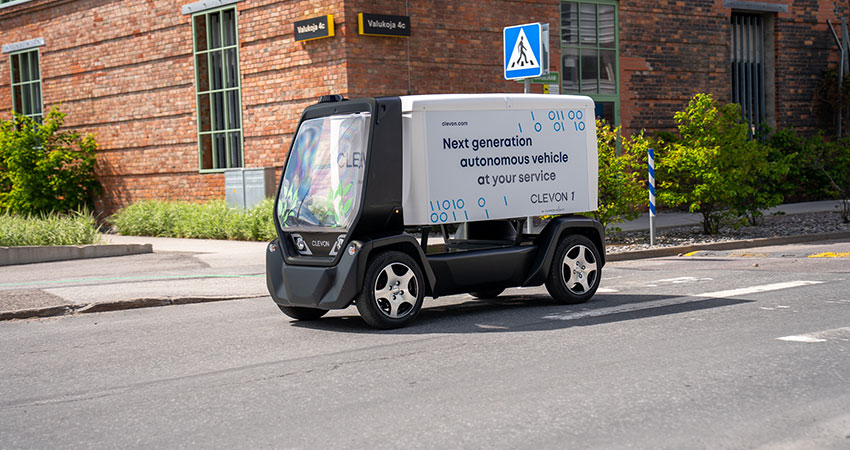Clevon, maker of autonomous vehicles designed to run on city streets instead of sidewalks like many others, has opened up a U.S. office in Fort Worth, TX to launch its planned expansion here, with a number of big-box retailers and delivery providers interested, according to its CEO.
The company was spun out of Estonian automated logistics provider Cleveron in March of this year, and is listed on Nasdaq’s North Baltic Exchange.
Clevon’s autonomous vehicles are smaller than a compact car but larger than cooler-sized delivery bots like fellow Estonians Starship. They have been in use commercially on European city streets since early 2020, the first to win such approval. Clevon has partnerships with logistics providers LaPoste/DPD and DHL Express, and Lithuanian grocer Iki. The company claims a 30% reduction in last-mile costs with its zero-emission vehicles.
The Clevon 1 platform uses a combination of cameras and radar, from tech partners like Nvidia and Toshiba, to provide data for mapping and guidance, similar to technology Tesla uses for its autonomous cars. Vehicles can be programmed to pick up orders at warehouses, retail stores, dark stores and MFCs for final delivery to end customers, servicing 4-5 households in a single trip.
Sander Sebastian Agur, CEO of Clevon, said the company is working to get to fully autonomous operation within closed environments. For now, supervisors in a network operations center continually monitor vehicles on public roads and can communicate with them or take over control. “Safety is the most important thing,” Agur said.
Clevon’s autonomous platform has a variety of form factors, depending on the business need and types of products, including a cargo box for retail, lockers and a small truck bed. Maximum payload is 200 lbs. and the largest box is 1.5 cubic meters. Vehicle top speed is 32 mph, but generally would be kept at 25 mph or less for safety reasons. Its range is about 62 miles on a charge, and most urban delivery operations would fall in a radius of 5 to 10 miles.
Agur said the company is working with local municipalities and legislators in the Dallas-Fort Worth area to get the necessary approvals in place for proof-of-concept testing on local streets. Agur said 10 such projects are in the pipeline through the end of 2023 with retailers and logistics companies, and plans call for mass production and commercial service the following year.
He said DFW was selected as a launch site due to its access to talent, as well as being an area conducive to autonomous operations through its AllianceTexas Mobility Innovation Zone. Others taking advantage of this environment include autonomous middle mile partnerships between FedEx and Aurora and Ryder and Gatik.
“Right now, we’re finding talent in the U.S., hiring in business development, software and hardware engineers, sales and marketing, and that’s where DFW comes in,” Agur said. “Manufacturing will stay in Europe, but as we build up a base here, and get a volume of orders, I think we’ll set up an assembly factory in the U.S. as well. It doesn’t make sense in the long run to ship cars here.”
Agur said Clevon has raised a total of 12 million Euros, noting the company has been running lean and efficient considering the capital required for an autonomous vehicle operation; he added another round is underway. He said Estonia has the most tech startup unicorns per capita in the world; Estonian president Alar Karis attended the U.S. launch last week.
“Autonomous vehicles are future but also present technology, something companies are already using,” he said. “They’re not a concept anymore. We’ll have more resources in future, which will only accelerate their adoption.”

